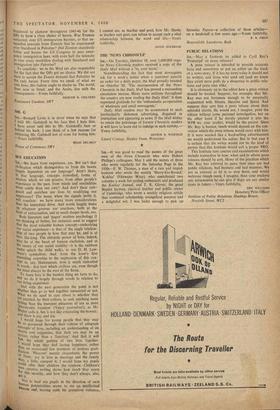SEX EDUCATION
Stk.—We learn from experience, yes. But isn't that civilisation which distinguishes us from the beasts largely dependent on our language? Aren't there, in that language, concepts embodied, forms of wisdom which we can possess, from other people's experience in the past, from minds and sensibilities More subtle than our own? And don't these safe- guard and enrichen our lives by modifying our appetences? The beast, when the signals invite it, will copulate: we have many more considerations than the immediate drive. And words largely make 1113 whatever governs our reactions, both at the level of ratiocination, and at much deeper levels, too.
Both literature and 'pagan' modern psychology (I am thinking of Suttee, for instance) seem to suggest that the most valuable human concept—embodying our racial experience—is that of the single relation- ship of two people in love that may be, and is at 'est. life-long. The altruistic power of love, indeed, may be at the heart of human evolution, and at the centre of our social stability—it is the rainbow under which the child walks, to use D. H. Law- rence's symbolism. And, from the lover's first stumbling courtship to the expression of this con- cept in, say, Shakespeare, love is much embodied m words: that love which civilises sex, even though sex must always be the root of the flame. To learn love is the hardest thing we have to do, and we do it largely through words in relation to our living experience. And with the next generation the point is not whether they go to bed together unmarried or not. What we do need to care about is whether they arc enabled, by their culture, to seek anything more acting than the transient pleasures of sex as mere pleasurable function' ('Enjoy yourselves'), as Mr. Walter calls it. Sex is not like evacuating the,bowels: and there is joy, and joy. I would hope for young people that they may be so possessed through their culture of adequate en, neepts of love, including an understanding of its claims and exigencies, that their sex may be an le.eslasY rather than a 'function.' And that it will 'k the whole pattern of two lives together. !, would hope they find lasting happiness, rather (Inan an occasional few moments of anxious grati- fication. 'Pleasure' merely exacerbates the power
of Time: joy in love in marriage and the family 'nay, a little, conquer it. I would hope my pupils could offer their children the rainbow. Children's 2wn creative writing shows how much they yearn
for this security, and how they don't always, alas, get it.
Not to lead our pupils in the direction of such 4,eas_mlan Potentialities seems to me an intellectual on and, leaving aside his gratuitous rudeness,
cannot see, as teacher and poet, how Mr. Davie, as teacher and poet, can refuse to accept such a vital relationship between the word and life.—Yours faithfully,
DAVID HOLBROOK














































 Previous page
Previous page